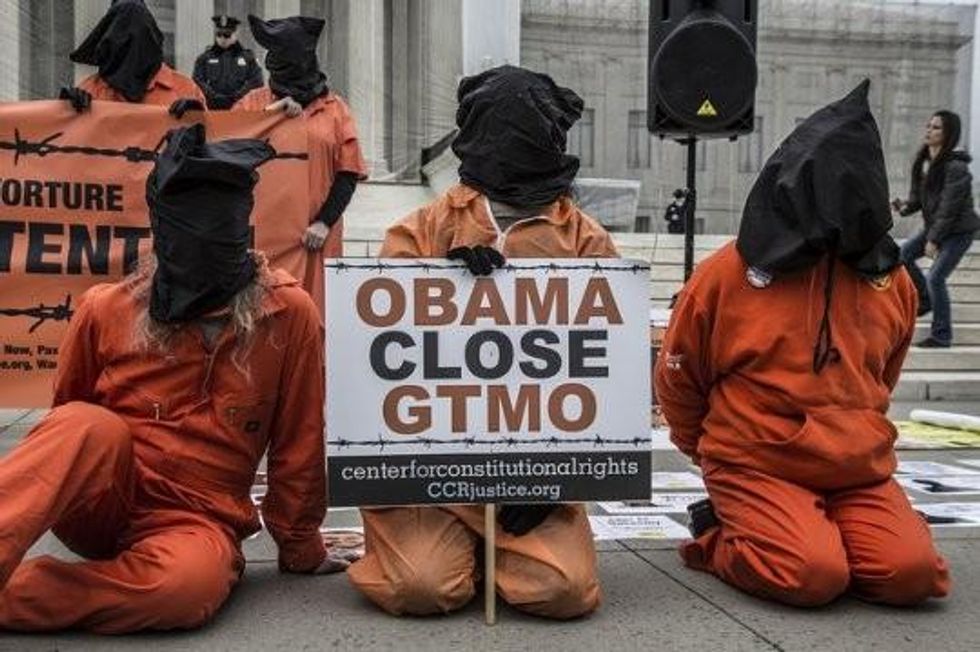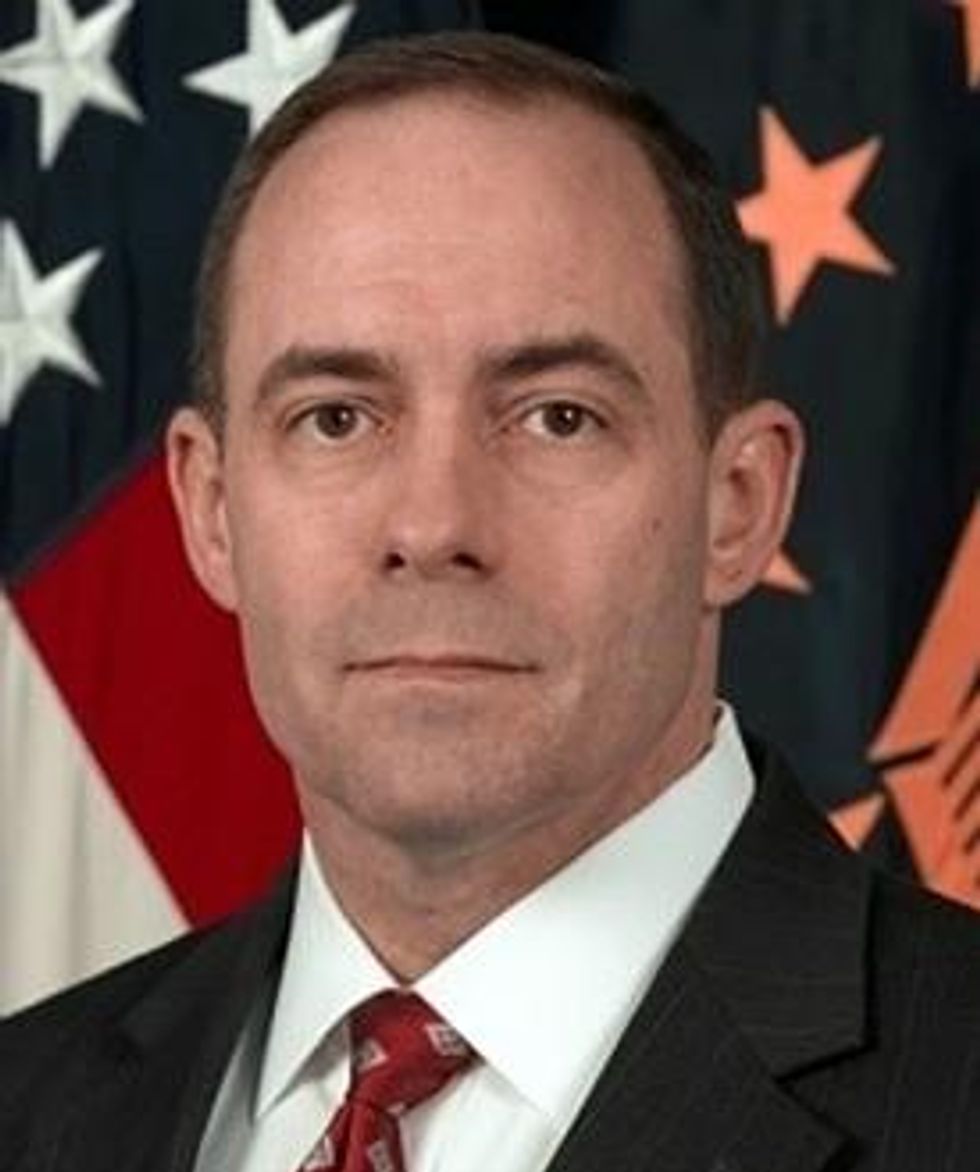

SUBSCRIBE TO OUR FREE NEWSLETTER
Daily news & progressive opinion—funded by the people, not the corporations—delivered straight to your inbox.
5
#000000
#FFFFFF
To donate by check, phone, or other method, see our More Ways to Give page.


Daily news & progressive opinion—funded by the people, not the corporations—delivered straight to your inbox.

William Lietzau, the Pentagon's top official on detainee policy, made the statement in an interview with the UK's The Mail on Sunday.
Instead, Lietzau told the paper, the prisoners should have been labeled prisoners of war and "held in Afghanistan," or, if they were charged with a crime, they should have been charged in federal courts, not the military commissions--the commissions he helped develop.
Further, he charged, George W. Bush's label of "'the global war on terrorism' had suffered from a lack of clarity, suggesting that it might be effectively limitless."
On torture at the prison, he said, "There were people who were treated badly, and this is not something we are proud of," and dismissed widespread reports of ongoing torture.
"Lietzau's right: the 'war on terror' was misguided and counterproductive from the start," stated Cori Crider, Strategic Director with the London-based human rights group Reprieve.

Just over a week ago, Lietzau announced that he would be stepping down from his position.
Lietzau's comments this weekend stand in contrast to his track record. As the New York Times' Charlie Savage reported, Lietzau
has played a major role in shaping detention policies across two administrations. After the terrorist attacks of Sept. 11, 2001, when he was a uniformed lawyer for the Marine Corps, he served as an adviser in the creation of the first version of President George W. Bush's system of military commissions trials.
In the Obama administration, he has been the primary official shaping policies for "law of war" detention at the prison at Guantanamo Bay and Bagram Air Base in Afghanistan.
In that role, he has frequently defended prisoner-of-war-style indefinite detention without trial, saying it is a moral, lawful and humane part of warfare. His leading role within the administration in defending its continued use in the open-ended war against Al Qaeda has drawn fire from many of the same critics angry at President Obama for failing to close the prison at Guantanamo.
In addition McClatchy reported that an anonymous administration official
noted that Lietzau had a reputation as a tough defender of holding suspected terrorists at Guantanamo even if there was no enough evidence to charge them with a crime.
"He was an obstacle," the official said. "There appeared to be divergent views on the existence of the facility. He just wasn't on board with the president."
_________________________
Dear Common Dreams reader, The U.S. is on a fast track to authoritarianism like nothing I've ever seen. Meanwhile, corporate news outlets are utterly capitulating to Trump, twisting their coverage to avoid drawing his ire while lining up to stuff cash in his pockets. That's why I believe that Common Dreams is doing the best and most consequential reporting that we've ever done. Our small but mighty team is a progressive reporting powerhouse, covering the news every day that the corporate media never will. Our mission has always been simple: To inform. To inspire. And to ignite change for the common good. Now here's the key piece that I want all our readers to understand: None of this would be possible without your financial support. That's not just some fundraising cliche. It's the absolute and literal truth. We don't accept corporate advertising and never will. We don't have a paywall because we don't think people should be blocked from critical news based on their ability to pay. Everything we do is funded by the donations of readers like you. Will you donate now to help power the nonprofit, independent reporting of Common Dreams? Thank you for being a vital member of our community. Together, we can keep independent journalism alive when it’s needed most. - Craig Brown, Co-founder |

William Lietzau, the Pentagon's top official on detainee policy, made the statement in an interview with the UK's The Mail on Sunday.
Instead, Lietzau told the paper, the prisoners should have been labeled prisoners of war and "held in Afghanistan," or, if they were charged with a crime, they should have been charged in federal courts, not the military commissions--the commissions he helped develop.
Further, he charged, George W. Bush's label of "'the global war on terrorism' had suffered from a lack of clarity, suggesting that it might be effectively limitless."
On torture at the prison, he said, "There were people who were treated badly, and this is not something we are proud of," and dismissed widespread reports of ongoing torture.
"Lietzau's right: the 'war on terror' was misguided and counterproductive from the start," stated Cori Crider, Strategic Director with the London-based human rights group Reprieve.

Just over a week ago, Lietzau announced that he would be stepping down from his position.
Lietzau's comments this weekend stand in contrast to his track record. As the New York Times' Charlie Savage reported, Lietzau
has played a major role in shaping detention policies across two administrations. After the terrorist attacks of Sept. 11, 2001, when he was a uniformed lawyer for the Marine Corps, he served as an adviser in the creation of the first version of President George W. Bush's system of military commissions trials.
In the Obama administration, he has been the primary official shaping policies for "law of war" detention at the prison at Guantanamo Bay and Bagram Air Base in Afghanistan.
In that role, he has frequently defended prisoner-of-war-style indefinite detention without trial, saying it is a moral, lawful and humane part of warfare. His leading role within the administration in defending its continued use in the open-ended war against Al Qaeda has drawn fire from many of the same critics angry at President Obama for failing to close the prison at Guantanamo.
In addition McClatchy reported that an anonymous administration official
noted that Lietzau had a reputation as a tough defender of holding suspected terrorists at Guantanamo even if there was no enough evidence to charge them with a crime.
"He was an obstacle," the official said. "There appeared to be divergent views on the existence of the facility. He just wasn't on board with the president."
_________________________

William Lietzau, the Pentagon's top official on detainee policy, made the statement in an interview with the UK's The Mail on Sunday.
Instead, Lietzau told the paper, the prisoners should have been labeled prisoners of war and "held in Afghanistan," or, if they were charged with a crime, they should have been charged in federal courts, not the military commissions--the commissions he helped develop.
Further, he charged, George W. Bush's label of "'the global war on terrorism' had suffered from a lack of clarity, suggesting that it might be effectively limitless."
On torture at the prison, he said, "There were people who were treated badly, and this is not something we are proud of," and dismissed widespread reports of ongoing torture.
"Lietzau's right: the 'war on terror' was misguided and counterproductive from the start," stated Cori Crider, Strategic Director with the London-based human rights group Reprieve.

Just over a week ago, Lietzau announced that he would be stepping down from his position.
Lietzau's comments this weekend stand in contrast to his track record. As the New York Times' Charlie Savage reported, Lietzau
has played a major role in shaping detention policies across two administrations. After the terrorist attacks of Sept. 11, 2001, when he was a uniformed lawyer for the Marine Corps, he served as an adviser in the creation of the first version of President George W. Bush's system of military commissions trials.
In the Obama administration, he has been the primary official shaping policies for "law of war" detention at the prison at Guantanamo Bay and Bagram Air Base in Afghanistan.
In that role, he has frequently defended prisoner-of-war-style indefinite detention without trial, saying it is a moral, lawful and humane part of warfare. His leading role within the administration in defending its continued use in the open-ended war against Al Qaeda has drawn fire from many of the same critics angry at President Obama for failing to close the prison at Guantanamo.
In addition McClatchy reported that an anonymous administration official
noted that Lietzau had a reputation as a tough defender of holding suspected terrorists at Guantanamo even if there was no enough evidence to charge them with a crime.
"He was an obstacle," the official said. "There appeared to be divergent views on the existence of the facility. He just wasn't on board with the president."
_________________________